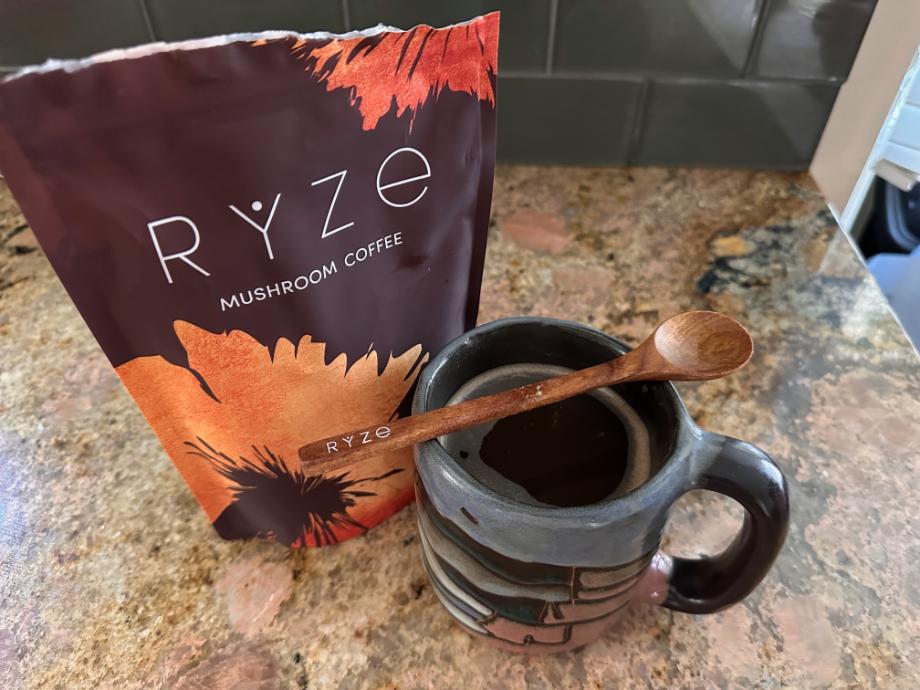We test and review fitness products based on an independent, multi-point methodology. If you use our links to purchase something, we may earn a commission. Read our disclosures.
Medicinal mushrooms have been used in Chinese medicine for hundreds of years to help treat several health concerns—including cancer, arthritis, respiratory problems, and insomnia. Today, their potential benefits have gained the attention of various wellness brands and supplement companies. You’ll find these powerful fungi in the best pre-workouts, energy drinks, vitamin gummies, sleep aids, and—yes!—coffee.
Not familiar with mushroom coffee? I’ll get you up to speed on this trending beverage. In this mushroom coffee review, I—a registered dietitian—plan on covering everything you need to know, including how it’s made, its potential health benefits, and any drawbacks. By the end, you might decide that it’s time to switch up your usual morning cup of joe.
What Is Mushroom Coffee?
Mushroom coffee is made by blending ground coffee beans with powdered medicinal mushrooms. Medicinal mushrooms—aka functional mushrooms—are superfoods that contain nutrients, antioxidants, and adaptogens that offer several potential health benefits. Mushrooms commonly used to make mushroom coffee include:
- Lion’s mane
- Reishi
- Shiitake
- Chaga
- Turkey tail
- Maitake
- Cordyceps
The fruiting bodies of the mushrooms are first dried and finely ground into a powder before being mixed with coffee grounds. The ratio of mushroom to coffee grounds varies by product, depending on the desired flavor profile. Mushroom coffee has a lower caffeine content than your regular cup of coffee and may be a good option for those wanting to reduce their caffeine intake without cutting it out completely.

RELATED: Coffee vs Pre-Workout
Mushroom coffee can be purchased in several forms to suit your personal preferences.
- Instant mushroom coffee: The mushroom coffee blend is brewed into a concentrated coffee extract that’s then dried into a powder. Simply mix the powder with hot or cold water for a quick and easy drink. Four Sigmatic Organic instant coffee is a great example, along with Laird Superfoods, which makes an instant latte version.
- Ground mushroom coffee: The combined powdered mushrooms and coffee grounds are roasted to develop a rich, earthy flavor with creamy and nutty notes. Consumers brew it just like regular coffee using water and a coffee maker. RYZE—a brand we tackled in our in-depth RYZE Mushroom Coffee review—is an excellent option for ground coffee fans.
- Mushroom coffee pods: Each pod contains a pre-measured coffee and mushroom powder blend to brew a single serving. They’re roasted to enhance flavor and can be used in a coffee maker, just like standard coffee pods.
Each option offers a different way to enjoy mushroom coffee, whether you prefer the convenience of instant coffee, the rich flavor of ground coffee, or the simplicity of coffee pods.
Benefits of Mushroom Coffee
The potential benefits of mushroom coffee for humans haven’t been well studied. While research suggests that medicinal mushrooms may offer several health benefits, there’s limited evidence to confirm these health benefits carry over when consumed as mushroom coffee rather than the whole mushroom. Based on the limited research available, here are some of the potential health benefits of mushroom coffee.
May Help Improve Immunity
Mushroom coffee is often made using mushroom extracts that may boost your immune system by enhancing your immune response and protecting those disease-fighting cells from damage caused by free radicals.
Turkey tail mushrooms contain polysaccharide K (PSK), a chemical compound that might strengthen the immune system in ways that may help combat cancer1. Several studies show that PSK may reduce the risk of recurrent cancer and lengthen the lifespan of cancer patients who took PSK alongside chemotherapy.

Reishi mushrooms may strengthen the immune system in those with lung cancer and potentially help prevent colorectal cancer. It contains compounds that reduce inflammation and could help cancer-fighting immune cells1, called lymphocytes, stay active.
Another common mushroom used in mushroom coffee—maitake—contains beta-glucans that can stimulate macrophages, NK cells, and T-cells. These immune cells coordinate to protect the body from a wide range of pathogens and abnormal cells, such as cancer cells. These beta-glucans may have antitumor effects on breast cancer2 cells by inhibiting cell growth and preventing the spread of tumors.
May Help Reduce Inflammation
Medicinal mushrooms contain substances with antioxidant properties. Antioxidants help reduce inflammation and protect cells from oxidative stress that can lead to illness, infection, and disease.
Mushroom coffee that includes lion’s mane may offer anti-inflammatory and neuroprotective benefits. Lion’s mane mushrooms work by inhibiting specific proteins and pathways that cause inflammation. It’s particularly effective at reducing inflammation in the brain2, making it potentially useful when treating neurodegenerative diseases.
Shiitake mushrooms, often used in mushroom coffee, contain polysaccharides called lentinans and other compounds that might help reduce inflammation. Studies on mice indicate that lentinans may lower the levels of inflammatory molecules and reduce the effects of endotoxins2, toxic substances found in certain bacteria.
RELATED: Best Greens Powder
May Assist in Lowering Cholesterol
Mushroom coffee contains medicinal mushrooms that could help reduce cholesterol levels and improve heart health.
In a study done on rodents3, reishi extract reduced total cholesterol, triglycerides, and LDL cholesterol (“bad” cholesterol) while increasing HDL cholesterol (“good” cholesterol). These findings suggest that reishi mushroom extracts could help lower the risk of heart disease by improving lipid profiles.
Shiitake mushrooms are another type of medicinal mushroom with potential cholesterol-lowering properties. Shiitake mushrooms contain beta-glucans, a type of soluble fiber known to help lower cholesterol levels4. Beta-glucans help decrease the absorption of cholesterol and promote its excretion.
RELATED: Best Fish Oil Supplement
May Contribute to Lower Stress Levels
Several types of mushrooms have adaptogenic properties. Adaptogens can help reduce the effects of stress on the body and may result in less feelings of anxiety. They influence the body’s stress response system to resist physical, chemical, or mental stress5.

Cordyceps is an adaptogenic mushroom that influences CREB binding protein (CBP), a protein involved in regulating genes that protect against stress. By affecting CBP and other pathways, Cordyceps may help reduce the risk of depression6, a mood disorder associated with mental stress.
Lion’s mane is another adaptogenic mushroom commonly used in mushroom coffee. Studies conducted on rodents indicate that lion’s mane can increase levels of dopamine7, serotonin, and norepinephrine in stressed subjects. These “feel-good” brain chemicals play a role in regulating mood and pleasure, potentially helping to reduce stress and alleviate symptoms of depression.
RELATED: Exercise for Anger
Risks and Possible Downsides of Mushroom Coffee
Mushroom coffee offers many potential benefits, such as reducing inflammation and stress, but there are also some drawbacks to consider. Before trying mushroom coffee, consider factors like its cost, the limited evidence supporting its benefits, and possible side effects.
Higher Price
Mushroom coffee typically comes with a higher price tag compared to regular coffee. The cost is likely higher due to the additional ingredients (mushroom extracts), more complex production process, and perceived benefits. People who choose mushroom coffee may be willing to pay a premium for specialty products made with high-quality medicinal ingredients.
Lack of Research
As previously mentioned, we lack human studies on the effectiveness of mushroom coffee in relation to health benefits. While there’s evidence supporting the benefits of medicinal mushrooms, many of these were done on rodents or in a lab. It’s also unclear how the potential benefits of functional mushrooms translate when they’re combined with coffee. Further research is necessary to verify the health claims, safety, and effectiveness of mushroom coffee.

Potential Side Effects
Potential side effects of mushroom coffee can include gastrointestinal discomfort, allergic reactions, dry mouth, or itchiness. Mushroom coffee also contains caffeine, and while the amount is typically lower than the average cup of black coffee, it can still cause jitters, stress, or anxiety in those with caffeine sensitivity. If you’re sensitive to caffeine, you may need to limit your intake.
RELATED: Best Low-Caffeine Pre-Workout
If you have any health conditions or are taking prescription medications, it’s important to consult your doctor or a registered dietitian nutritionist (RDN) before trying mushroom coffee.
What Is Mushroom Coffee? Final Thoughts
Mushroom coffee is created by blending coffee grounds with powdered medicinal mushrooms. It has less caffeine than regular coffee and may offer potential benefits linked to medicinal mushrooms. Limited research suggests functional mushrooms could help improve immunity, reduce stress, lower cholesterol, and decrease inflammation, but there isn’t enough research to confirm these benefits definitively. While mushroom coffee can be more expensive, it might be a worthwhile choice for those looking to enhance their health while reducing their caffeine intake.
What Is Mushroom Coffee? FAQs
What is the point of mushroom coffee?
Individuals who drink mushroom coffee aim to mix the comfort, taste, and caffeine of regular coffee with the potential health benefits of medicinal mushrooms. Mushroom coffee may include ingredients that help reduce stress, cholesterol, and inflammation.
Is it safe to drink mushroom coffee every day?
For most people, drinking mushroom coffee every day may be safe. However, due to limited research, the full range of potential side effects isn’t well understood. If you have a medical condition or are taking prescription medications, consult your healthcare provider before trying mushroom coffee to ensure it’s safe for you.
Does mushroom coffee detox your body?
No, mushroom coffee doesn’t detox your body. Your kidneys and liver are mainly responsible for removing toxins from your body. While mushroom coffee contains antioxidant-rich mushroom powders that may boost immune function, it doesn’t act as a detox.
Who shouldn’t drink mushroom coffee?
Due to a lack of research, it’s unclear who should or shouldn’t drink mushroom coffee. If you’re pregnant, taking prescription medication, or have a medical condition, consult your physician before incorporating mushroom coffee into your daily routine.
Does mushroom coffee reduce belly fat?
Mushroom coffee alone is unlikely to reduce belly fat. While some research8 suggests that regular consumption of medicinal mushrooms may support weight loss, a more effective approach involves a balanced diet and regular exercise.
References
- National Cancer Institute. Medicinal Mushrooms. Updated July 11, 2024. Accessed August 2, 2024.
- Venturella G, Ferraro V, Cirlincione F, Gargano ML. Medicinal Mushrooms: Bioactive Compounds, Use, and Clinical Trials. Int J Mol Sci. 2021;22(2):634. Published 2021 Jan 10. doi:10.3390/ijms22020634
- Rahman MA, Abdullah N, Aminudin N. Evaluation of the Antioxidative and Hypo-cholesterolemic Effects of Lingzhi or Reishi Medicinal Mushroom, Ganoderma lucidum (Agaricomycetes), in Ameliorating Cardiovascular Disease. Int J Med Mushrooms. 2018;20(10):961-969. doi: 10.1615/IntJMedMushrooms.2018028370. PMID: 30806268.
- Bak WC, Park JH, Park YA, Ka KH. Determination of Glucan Contents in the Fruiting Bodies and Mycelia of Lentinula edodes Cultivars. Mycobiology. 2014 Sep;42(3):301-4. doi: 10.5941/MYCO.2014.42.3.301. Epub 2014 Sep 30. PMID: 25346611; PMCID: PMC4206800.
- Liao LY, He YF, Li L, et al. A preliminary review of studies on adaptogens: comparison of their bioactivity in TCM with that of ginseng-like herbs used worldwide. Chin Med. 2018;13:57. Published 2018 Nov 16. doi:10.1186/s13020-018-0214-9
- Zhang X, Wang M, Qiao Y, et al. Exploring the mechanisms of action of Cordyceps sinensis for the treatment of depression using network pharmacology and molecular docking. Ann Transl Med. 2022;10(6):282. doi:10.21037/atm-22-762
- Chiu CH, Chyau CC, Chen CC, et al. Erinacine A-Enriched Hericium erinaceus Mycelium Produces Antidepressant-Like Effects through Modulating BDNF/PI3K/Akt/GSK-3β Signaling in Mice. Int J Mol Sci. 2018;19(2):341. Published 2018 Jan 24. doi:10.3390/ijms19020341
- Ganesan K, Xu B. Anti-Obesity Effects of Medicinal and Edible Mushrooms. Molecules. 2018;23(11):2880. Published 2018 Nov 5. doi:10.3390/molecules23112880
Further reading

Gone are the days where you have to decide between buying a reverse hyper or a glute ham developer. Learn more in this Bells of Steel Reverse Hammer review. Read more

If you’re here to get your recovery in natural scenery, you’re in luck; here are our expert-tested selections for the best outdoor saunas. Read more

The Marc Pro is a muscle conditioning device that stimulates your muscles to improve their performance and recover from muscle breakdown. Through months of use, we found that we felt more recovered after using the device. However, we do recognize that this could be a placebo effect. Read more

Our KOS Kiss Your Blues Away review analyzes the nutrient facts of this popular superfood supplement. Is it any good? Find out here. Read more

